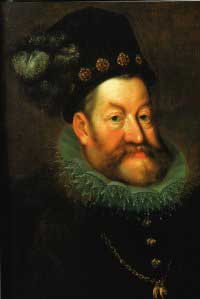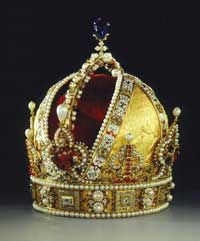Rudolf II, 1552–1612, Holy Roman emperor (1576–1612), king of Bohemia (1575–1611) and of Hungary (1572–1608), son and successor of Holy Roman Emperor Maximilian II. Acceding to the Hapsburg lands, he reversed his father's tolerant policy toward Protestantism and gave assistance to the Counter Reformation. Although Rudolf was a learned man, he was incapable of ruling because he was plagued by melancholy and later became subject to occasional fits of insanity. Other members of his family began to intervene in imperial affairs. Following a revolt in Hungary (1604–6) by Stephen Bocskay and his Ottoman allies, most of the actual ruling power passed to Rudolf's brother Matthias; the revolt was provoked by Rudolf's attempt to impose Roman Catholicism in Hungary. In 1608, Matthias forced Rudolf to cede Hungary, Austria, and Moravia to him. Seeking to gain the support of the Bohemian estates, Rudolf issued (1609) a royal charter that guaranteed religious freedom to the nobles and cities. This effort was in vain, and Rudolf was forced to give up Bohemia to Matthias in 1611. Rudolf's turbulent reign was a prelude to the Thirty Years War.

Rudolf was an intelligent and gifted man. He spoke several languages with ease,
had a good taste for art and was interested in mathematics and science. Since
his return from Spain, however, Rudolf suffered from dark moods and after his
crowning they continued to deepen. Those were troubled times. Germany was divided
by Protestant and Catholic factions. A mighty earthquake took place in Vienna
and the plague came and went, as did the Turks. In 1577 Rudolf suffered his first
emotional breakdown, became severely melancholic and rarely left the castle. Four
years later, he was so ill that there were fears for his life. He rapidly lost
weight. The next year he decided to move his residence permanently to Prague in
Bohemia to escape the crowds and pressures of Vienna. He turned to the study of
astronomy and magic and started collecting beautiful and curious objects.
Rudolf gathered astronomers, humanists, physicians, artist, craftsmen and
antiquarians about him. In the castle gardens the Danish astronomer, Tycho Brahe,
set up his instruments for observing the stars and wrote down his measurements
of the planetary movements. When Rudolf's cousin, Archduke Ferdinand of Styria,
banished Johannes Kepler from his province, Rudolf welcomed him at his court.
Using Brahe's computations, known as the "Rudolphine Tables", Kepler
developed his theory of the elliptical movements of the planets. Meanwhile,
alchemists stirred mysterious vats in the kitchens of Hradschin castle, experimenting
with elixirs. Exotic animals strolled through the corridors. In addition, Rudolf
collected paintings of, among others, Breughel and Correggio.
|

